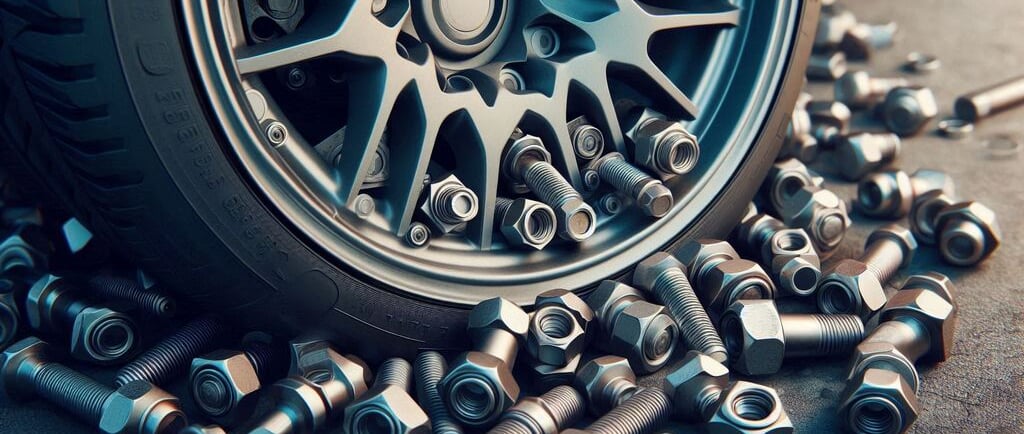Lug Nuts: Secure wheels to the vehicle.
When it comes to vehicle safety, there are many components that ensure your car runs smoothly and safely. One crucial yet often overlooked part is the lug nut.
TIRES AND WHEELS
11/13/20244 min read


Lug Nuts: Secure Wheels to the Vehicle
When it comes to vehicle safety, there are many components that ensure your car runs smoothly and safely. One crucial yet often overlooked part is the lug nut. These small but vital components play a key role in keeping your wheels securely attached to your vehicle. In this article, we'll dive deep into what lug nuts are, their types, and how to properly install and maintain them. By the end, you'll understand why these tiny parts are indispensable for your car's performance and safety.
What Are Lug Nuts and Why Are They Important?
The Essential Role of Lug Nuts
At the most basic level, lug nuts are used to fasten your vehicle's wheels to the hub or axle. Without them, your wheels would simply fall off, leading to dangerous situations on the road. In essence, they are responsible for ensuring that the wheels remain secure during driving, providing stability and safety.
Key functions of lug nuts include:
Securing the Wheels: Lug nuts are the primary means of securing a wheel to the vehicle’s axle.
Distributing Pressure: When tightened, lug nuts evenly distribute the pressure across the wheel, preventing any warping or damage.
Maintaining Safety: Properly tightened lug nuts prevent wheels from loosening or falling off, which could lead to serious accidents.
Without functioning lug nuts, driving your vehicle would not only be unsafe, but it could also cause damage to other parts of the car. So, while they might seem small and insignificant, lug nuts are crucial to your vehicle’s overall safety.
Types of Lug Nuts
1. Standard Lug Nuts
These are the most common type of lug nut and are typically found on everyday passenger vehicles. Standard lug nuts come in a variety of shapes, including hexagonal and cylindrical, but they all serve the same basic purpose—securing your wheels.
Use: Found on most cars and trucks.
Material: Often made from steel or aluminum for durability.
Advantages: Easy to install and replace, and they are widely available.
2. Locking Lug Nuts
Locking lug nuts add an extra layer of security by preventing theft. Unlike standard lug nuts, they require a special key to be removed, making it much more difficult for thieves to steal your wheels.
Use: Ideal for vehicles with high-value or custom wheels.
Advantages: Provides peace of mind and extra protection from theft.
3. Mag Lug Nuts
Magnesium lug nuts, often referred to as mag lug nuts, are designed for lightweight, high-performance wheels. These are commonly used in sports cars and vehicles designed for high-speed performance.
Use: Performance vehicles and sports cars.
Advantages: Lightweight and strong, ideal for racing and high-performance applications.
4. Extended Lug Nuts
If you're driving a truck or an off-road vehicle, you may need extended lug nuts. These nuts are designed with a longer thread to accommodate larger wheels and rims, which are common in off-roading vehicles.
Use: Trucks, off-road vehicles, and cars with larger or custom wheels.
Advantages: Provides extra stability for large wheels and rims.
Proper Installation and Tightening of Lug Nuts
How to Install Lug Nuts Correctly
Proper installation of lug nuts is critical for ensuring the safety of your vehicle. If the nuts aren’t tightened correctly, the wheel can come loose while driving, potentially leading to accidents. Here are some steps for installing and tightening lug nuts properly:
Position the Wheel: Align the wheel with the hub and secure it loosely with the lug nuts. Hand-tighten them to ensure they fit properly.
Use a Torque Wrench: A torque wrench ensures that you tighten the lug nuts to the correct specification. Each vehicle has a specific torque value, so refer to your vehicle’s manual for the recommended torque setting.
Tighten in a Star Pattern: When tightening lug nuts, always follow a criss-cross or star pattern. This helps evenly distribute the pressure across the wheel, preventing warping and ensuring a secure fit.
Double-Check: After tightening the nuts, drive the vehicle a short distance, then check the lug nuts again. This ensures that they haven’t loosened during your drive.
Why Tightening Torque Matters
It’s easy to think that simply cranking the lug nuts as tight as possible will do the job, but over-tightening can cause damage. Too much pressure can crack the lug nuts or damage the threads on the wheel bolts. The key is to apply the correct amount of torque—just enough to secure the wheel without causing damage.
How to Maintain and Replace Lug Nuts
Regular Inspection
Your lug nuts should be checked regularly for signs of wear, rust, or damage. If they’re rusted, corroded, or stripped, they can’t provide the necessary security for your wheels. Here’s how to maintain your lug nuts:
Check for Rust and Corrosion: Rust can weaken the lug nut and make it difficult to remove or tighten.
Look for Wear and Tear: Over time, lug nuts can become rounded or stripped, which means they’ll no longer fit properly. If you notice any of these issues, it’s time to replace them.
Replacing Lug Nuts
If you find that your lug nuts are damaged or worn, it’s crucial to replace them. When purchasing new lug nuts, make sure to select the correct size and type for your vehicle. Using the wrong size could lead to improper installation and, in turn, safety risks.
Fit Matters: Always ensure that the new lug nuts are the right size for your vehicle’s wheel bolts.
Material Choice: Depending on the environment and your driving conditions, you may want to choose lug nuts made from materials resistant to corrosion, such as chrome or stainless steel.
Conclusion: Secure Your Wheels, Stay Safe
Lug nuts may be small, but they play a big role in keeping your vehicle’s wheels securely fastened and ensuring a safe driving experience. Regularly inspecting, properly installing, and maintaining your lug nuts are all essential steps for vehicle safety. Whether you're a car enthusiast or just someone who wants to keep their ride in top shape, understanding and caring for your lug nuts will help keep your wheels securely attached and your vehicle performing at its best.


